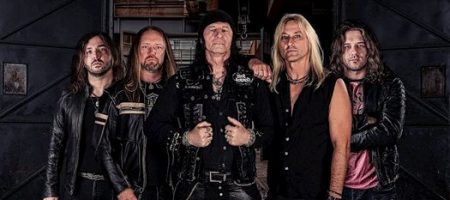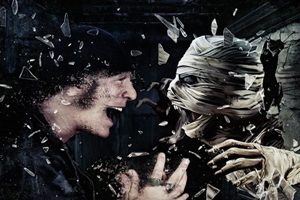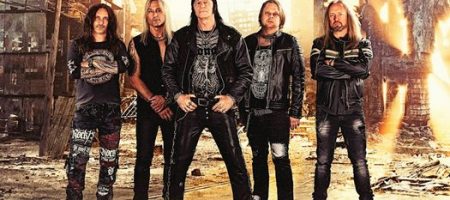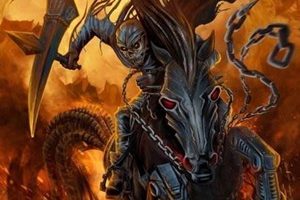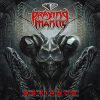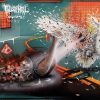Herman Frank – Metal for the Team
Monday, 21st November 2016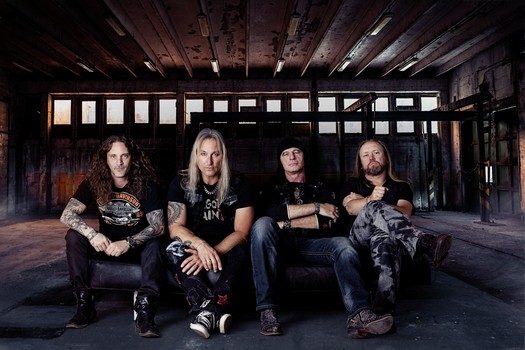
Even though it’s Herman Frank at the center of this conversation, he is well aware of the fact that he needs a complimentary set of killer musicians around him to execute high quality records. As one of the premiere guitarists in metal who you probably know from Accept, he’s also worked in Victory, Moon Doc, and Panzer most recently. Since leaving Accept, the focus is back on Herman’s individual work – of which a third album The Devil Rides Out proves that traditional metal chock full of catchy riffs, hooks, and standup melodies still matters in the current market place.
Firing up the Skype app to ring Herman in Germany, you quickly find that the man still has a keen sense of humor when tackling interviews. So this quickly turned into a fun conversation with plenty of laughter as we hit upon how the current lineup came to be, possible plans for shows down the line, as well as his thoughts as a producer in today’s changing climate where some younger musicians would rather use tools to fix things than actually practice their craft for a better final product. There’s just something about the veterans of metal that still get the job done… check out the new Herman Frank album if you need that blues-based heavy metal pumping through your veins.
Dead Rhetoric: The Devil Rides Out is the third Herman Frank album – and first to contain new bassist Michael Müller and drummer André Hilgers. What do you believe they bring to the table that made this record as strong (or stronger) as the first two efforts – and do you believe you and Rick have great chemistry and instincts to know how to deliver high quality material time and again?
Herman Frank: Yes, and yes – I agree totally with what you said. It works out really nice with Rick, so we recorded one album together and we know what the other person is expecting when we get into the studio. He’s delivering such great melodies and such great performances, it’s awesome. The new drummer André Hilgers, there’s not that much I can really say except he’s fantastic. He fits with my guitars, the songs, and the way I’m composing and the way I want to have the energy and power of the drums. And Michael Müller, I’ve never had such a great bassist in my life. I knew André for a couple of years- we always met at some festivals where I would be there with Accept and he was there with Rage. We always talked about doing something together sooner or later musically. He’s known as a really good drummer in Germany, that was my first choice for this album. And Michael, Rick recommended him. Then when Rick and I decided we were going to do a new album, I asked André if he knew any bass players. Rick said he knew a guy – and he’s good looking! (laughs). I asked if he was able to play the bass and Rick said, ‘yes he is!’ (laughs). Then we met in Hannover, he came over to my studio in my house and played there, it was perfect. And he is good looking- I have to tell the truth! (laughs)
Dead Rhetoric: How would you describe your own personal style and outlook when it comes to guitar playing and songwriting? I feel a strong love for say Randy Rhoads, Ritchie Blackmore, and John Sykes on new songs like “Shout” and “Stone Cold” for instance…what stand out moments did you have in the recording or performance aspect for this record?
Frank: For sure. First of all, in these days or the last couple of records I am always looking for the energy- or the roughness in the guitar. I like things as they can be played live, in the studio. Often I leave the demo guitars on the final CD, because I never can reproduce them in this same roughness. If you start composing the songs and putting these guitars down, mostly they are the best in performance. Back to my roots- I am coming from Blackmore, Ted Nugent, and as you said John Sykes is one of my heroes. I listen to a lot of their songs- that’s kind of my style too. I always want to put some melody and catchy riffs- not fiddling around too much and playing like some people do nowadays where you are acting like a calculator. I mean up and down arpeggios, that’s boring.
Dead Rhetoric: Do you think first takes are important?
Frank: Yes. If you just jam around for the first time and you play a lead, you may have a great time because you are fresh-minded and you can do something that maybe that wasn’t perfect that works.
Dead Rhetoric: Are there particular times of the day that work best when it comes to ideas?
Frank: Usually when I start warming up on guitar. Normally I go to the studio between 10 and 11 in the morning. I’m not into the night shift anymore. My lifestyle has changed a little bit in the last couple of decades. (laughs)
Dead Rhetoric: Tell us about the video shoot for “Ballhog Zone” – who decided on the street racing theme intertwined with performance footage, and where was this shot? Did you use your own personal cars or find friends willing to allow the use of them for the video?
Frank: First of all, we didn’t have the budget of Steven Spielberg (laughs). We had to come up with something. So the director said we should do a little bit of live performing so people can see the faces of the musicians who made the song, and we will put some kind of story behind it about the ballhog thing. We came up with a typical rock ‘n’ roll thing- these cars, and Rick lost his motorbike to this guy that was driving a Corvette- so he had to do this street race to get his bike back. The guy who was driving the Corvette, the tough looking guy, he’s a friend of mine and these are his cars. When you are filming in the car, you can’t be going 200 mph though. Germans love fast cars!
Dead Rhetoric: Do you feel like AFM Records did the right thing in setting up this release by re-issuing your first two albums, which were only released on Metal Heaven in Europe originally?
Frank: I’m really glad about them re-releasing these records because you couldn’t get them in Europe in any shops. Fans couldn’t buy them, and when we were touring with Accept we would have autograph sessions and everybody would be asking me where they could buy those two records. Metal Heaven was a smaller kind of record company, so they didn’t put out anymore. I’m really glad that AFM re-released them, and it’s a fine thing that works out. People can get the new record and if they’ve never heard about the other ones, they can now get them too. And it fills the fridge! (laughs)
Dead Rhetoric: Are you surprised by the changing business model of heavy metal today where many active musicians (yourselves included) have other bands/projects going to sustain a living at this?
Frank: These days, if you are doing music…I do like to play under a couple of different playgrounds with different kinds of music. So if you work the whole year, the early bird catches the worm, and I am working a lot on the music side. If you want to be big as Accept, then you might have a little more time to do more than one band- so you do side projects. And you have to do this if you want to make a living out of it.
Dead Rhetoric: What would you say are some of your career defining moments either in terms of special records or live touring memories that will stay forever in your brain and body?
Frank: There is a lot! You got any time left? (laughs). There are so many moments, you can’t think about one particular moment. For sure, the first time I went to play in Japan or for the US. Back in… 1987 or 1988, that was my first time to go on tour with Victory in the US. If you hit one certain venue for the first time, like doing your first Wacken show in front of 70,000 people that’s an exciting moment. On the other hand, I did with Panzer last December a small venue in Metal Daze in Essen, Germany. We played in front of maybe 220 people but the place was so crowded and went so wild- these are also moments still to remember. It doesn’t matter if it’s a bigger show or a smaller show.
Dead Rhetoric: Will there be a second Panzer album down the line, and how do you feel about working in a tight knit three-piece outfit with such an iconic thrash bassist/singer as Schmier from Destruction?
Frank: Not with me in the lineup! I loved the first record, and it worked out musical-wise really, really well. I was excited about doing a little bit different style of guitar playing and songwriting with Schmier’s voice on top. I loved the record I wrote- I did 10 out of the 12 songs. I can’t go on with this though- it was maybe a one year project wonder.
Dead Rhetoric: How do you feel about your different times being in Accept during the 1980’s and when the band was resurrected in 2009-2014? It just seemed very strange that you and drummer Stefan were let go for scheduling and other conflicts beyond their control, as you always made yourselves available for all recording and touring obligations…
Frank: The answer to these questions… ah, like Ozzy Osbourne used to say, I can’t remember these things anymore. I spoke enough about these things, it’s history. Everybody can think about a different story. In the end, it was a good decision that I left Accept.
Dead Rhetoric: As a producer in addition to your recording endeavors, what do you hope to get out of each artist you work with – do you take things on a case by case basis?
Frank: Sure, first we have to look for the talent of the band and the style of the band. I don’t want to change them like Mutt Lange did with every band. He’s the biggest producer ever, but he was giving the bands a certain sound. For example, Saxon should sound like Saxon- and the mix should sound like Saxon. If you do a different band, it should sound special. You have to try to get the talent, and try to persuade them if they don’t have a catchy hook line. I try to really work with them on the composing side, the drummers with different beats. You might want to persuade them too that they shouldn’t record tougher stuff, some guitar players want to play really difficult leads but they can’t properly record them, then perhaps they shouldn’t be playing them. I would talk to them about coming up with a smoother thing.
Dead Rhetoric: Where do you see the differences between recording digitally today versus analog recording in your early days?
Frank: You really had to play. More or less one take. You could punch in and punch out, but it wasn’t that easy, compared to copying and pasting in the digital age. Therefore, you had to practice and you had to know the songs. When it was on tape, it was on tape- these days, things are never finished because you may want to re-amp with a different sound, or maybe copy this particular phrase from the bass into the beginning. It takes more time, and everybody is expecting Autotune on their vocals. (laughs). In the older days, you had to know what you are going to do. These days the musicians are asking more for tools to fix their playing.
Dead Rhetoric: And what are your thoughts on backing tracks/computers for live performance aspects?
Frank: I may use backing tracks for some of my vocals- as I am not the best singer. On this record, Rick did most of the vocals, and I put my voice underneath just to give it a little growly and deeper voice on it. If I have to do this live, it may be tough for me. We might use backing vocals a little bit- but I never would use any guitars for backing tracks, I don’t want to. If there is a part in one song with say an intro that has a keyboard, I won’t bring a keyboard out on the road for one song, so I would use it. That’s fair enough.
Dead Rhetoric: Who are some of your favorite musicians that you have had the good fortune to meet and spend time with during your career – have any provided any words of wisdom and sage advice that you took to heart?
Frank: There are couple of them- Lemmy I spoke to a couple of times, Biff (Byford) from Saxon. They told me I never should stop doing music, if you have it in your heart you need to always get it out. As long as you have something to tell, tell it. Put it out and write songs. There are so many idols I’ve met- once I met John Sykes. He was doing a show in Hannover with the Thin Lizzy reunion, and I was pretty overwhelmed about his playing. He said a couple of words to me, he was gentleman-like, but he didn’t know who I was.
Dead Rhetoric: Would you still consider Germany the metal mecca of Europe?
Frank: I can’t tell. Scandinavia is doing good things too. But Germany, there are a lot of bands doing this kind of heavy metal, so yeah you may be right. I agree.
Dead Rhetoric: How do you see the next twelve months as far as support for this record and other recording ventures? Would you like to be able to take the band not only across Europe but other territories- possibly venturing into North American even if it’s on a short run?
Frank: I would love to, if somebody can pay for the tour! I would love to play all over the world, but in the end, you have to find people willing to finance it. Maybe not this year, but for the next record. At the end of February we will do in Europe a couple of one-off shows, because I’ve never played with this band live on stage. We will get a little practice on stage, and then maybe hit some of the summer festivals. I just finished the mix of a live, double Victory CD. 22 tracks we recorded over the last two years. It’s easy to make live albums these days thanks to computers. This will maybe be released towards December or early January 2017.












